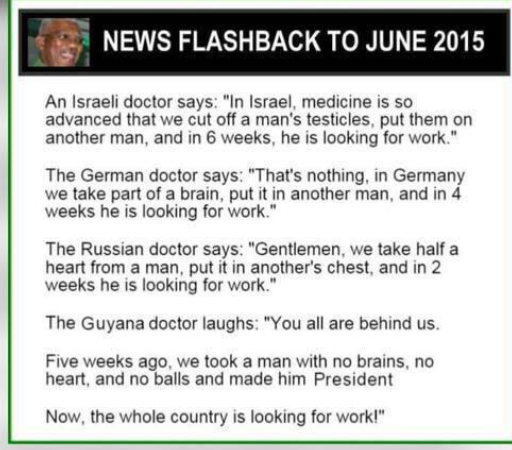Stabroek News
GUYANA has slipped below Haiti and is now ranked as the poorest country in the Western Hemisphere.
This is the startling conclusion in the just-released McIntyre report which also says the country needs a political system which ‘encourages the participation of all Guyanese in the recovery programme.
The report suggests that what is also needed is ‘a restoration of confidence in the ability of the government to manage the economy and share its benefits widely.’
The document is the work of a Commonwealth team headed by former Caricom Secretary General. Mr. Alister McIntyre. The mission spent over a year analysing the state of affairs here and its recommendations, circulated in Parliament this week by government, attempt to point the way forward. ‘Guyana is now ranked below Haiti as the poorest country in the Western Hemisphere,’ the team says.
The mission also found that the steady economic and financial deterioration of the country has led to people leaving the country at the rate of about 1,000 a month. This rate works out to about three per cent of people of working age leaving the country each year.
It puts inflation at 50 per cent per annum and unemployment at 40 per cent of the work force. Government’s excessive control of the economy, which limited the role of private initiative and investment, also contributed to massive migration of ‘Guyana’s best and brightest,’ the team says.
The advisory group says government’s corrective measures over the past decade lacked political support and the institutional capacity to undertake ‘ strong adjustment measures.
The grim financial and economic data apart, the report says the greater loss has been the deterioration in the physical quality of life of the population. Average incomes have fallen since 1980 by 50 per cent and hunger and malnutrition have grown. Homelessness and vagrancy have become major problems and the poor spend most of their time looking for food, the mission found.
It also feels Guyana is among the most heavily indebted developing countries in the world and the team says it is likely that the indebtedness works out to about $2,500 (US) for every man, woman and child.
The McIntyre mission however says the government has no alternative at present but to work within the IMF-approved recovery framework. The team members are in broad agreement with the overall objectives and the required policy measures of the Economic Recovery Programme.
They however, contend that the IMF and World Bank and other financial institutions have given insufficient attention to relief measures for the poor, to vital imports and to the unmanageability of the debt burden.
The report adds, ‘donors must also recognise that the social impact of adjustment goes beyond the burden on particular groups. It encompasses the wider issue of sustaining social cohesion and democratic processes.
Experience elsewhere indicates that popular protests against price increases and other austerity measures could degenerate into more generalised social unrest and the possibility of a breakdown in civilian government.
‘This is a risk which many governments face in implementing structural adjustment programmes, and it is a risk which should be more fully taken into account in designing the scope and timing of adjustment measures.’
The team says the essence of the real adjustment programme will require shifts of local labour, land and capital from one set of uses to another.
‘We encourage the government to strengthen its efforts to explain the real, as opposed to the purely financial, nature of the required adjustments. The public must understand that major shifts in the use of domestic resources are envisaged. Immediate consumption must be reduced and real incomes will be redistributed among alternative current income-generating activities.’
The mission also advises that if people are to take up ‘the vision of greater prospects for all in the economy,’ government’s message ‘must carry conviction and persuasion.’
‘This argues for an extremely well conceived and implemented programme of public relations, and for strenuous efforts to open up public discussion of development issues.’
The last curtain falls
Dignum laude virum Musa vetat mori’ (The hero who is worthy of her praise the Muse will not let die) Horace: THE ODES.




